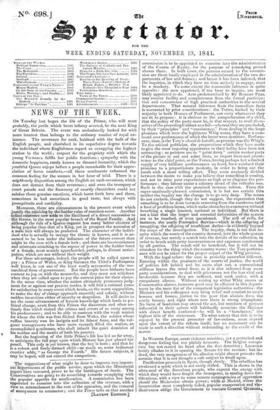The suggestions of what might be done to improve two
import- ant ilepartinents of the public service, upon which the Ministerial papers have ventured, prove to be the harbingers of deeds. The Conservatives are goitr, to do something towards complying with the popular appetite for amelioration. A commission has been appointed to examine into the collection of the revenue, with a view to retrenchment in the cost of the operation, and the removal of annoyances to commerce ; and the Times tells us that another commission is to be appointed to examine into the administration of the Courts of Equity, for the purpose of remedying proved abuses there. In both cases, the persons named to the commis- sion are those busily employed in the administration of the two de- partments of law and finance ; and hence it has been inferred, that the inquiries, in which they have no time actively to engage, must be a mockery. To some extent the reasonable inference is quite opposite : the men appointed, if too busy to inquire, are most likely appointed to do. Acts predetermined by Sir ROBERT PEEL may receive facility and completeness front the formal participa- tion and concurrence of high practical authorities in the several departments. That natural inference from the immediate facts is warranted by prior considerations : the Tories, backed by their majority in both Houses of Parliament, can carry whatsoever they see tit to propose : it is obvious to the comprehension of a child, that the policy of the party must be, in that respect, to avail them- selves of the preceding Cabinet as a foil—whereas they are precluded, by their "principles" and "consistency," from dealing in the large promises which were the legitimate Whig wares, they have a com- mand over performance of which the latter were destitute. Perform- ance, then, is the Tory's clieval de bataille, as promise was the Whig's. To the critical politician, the preparations which they have made to give the most imposing appearance to their hobby have been not unamusing : as painters use to " paint down" certain weaker parts of the picture in sad and sober tints, to impart force and promi- nence to the chief point, so the Tories, having perhaps but a limited supply of very brilliant performances on hand, have subdued their promises to a proportionate modesty, iu order to bring out the result with a more telling effect. They seem anxiously divided between the desire to make you believe that something is coining, and not to raise your expectations so high as to disgrace the per- formance : they labour under a salutary dread of the rideculus Such is the case with the promised revenue reform. From the super-cautiously-phrased commission, it is but too certain thta neither the inquiry nor the change is to go very deep. The terms do not exclude, though they do not suggest, the expectation that something is to be done towards removing from the cumbrous tariff a host of profitless items, which make obstacles to commerce without benefiting a single interest, national or individual. .But there is not a hint that the larger and essential deformities or the system are to be touched, or even questioned. The evil of evils, for instance, the costly Preventive Service—which is the offspring of smuggling;the offspring of exorbitant duties—is evidently beyond the scope of the investigation. The inquiry, then, is not that in- quiry which the wants of the country demand, into the whole system of revenue, but merely a search into the details of its collection, in order to brush aside petty inconveniences and expenses condemned by all parties. The result will be beneficial, but it will not be mistaken for the thing which the country wants : the Tory perform- ance will not be taken for the proper sequel of the Whig promise.
With the legal reform the case is probably somewhat different. Entering within the precincts of the courts of justice, the world of politics left behind and its cants shut out, a conventional stillness leaves the mind freer, as it is also released from mere party considerations, to deal with grievances not the less vital and intolerable because they are suffered, and sunk under, with a compulsory silence. Without raising up either Whig sneers or Conservative alarms, immense good may be effected in this depart- ment by the mere fiat of the competent legislative authorities : the Minister and his colleagues may bring relief and comfort to men's bosoms and homes, justice to the poor that abstain from the costly luxury, and right where now there is wrong triumphant. No burst of laudation may attend the act, but numbers of persons influential in their sphere will habitually associate the Minister with direct benefit conferred—he will be a "benefactor," the highest title of the statesman. To what extent that title is to be enjoyed by the present promoter of law-reform, must depend upon the extent of the reform itself; but no movement can be made in such a direction without redounding to the credit of the mover.


























